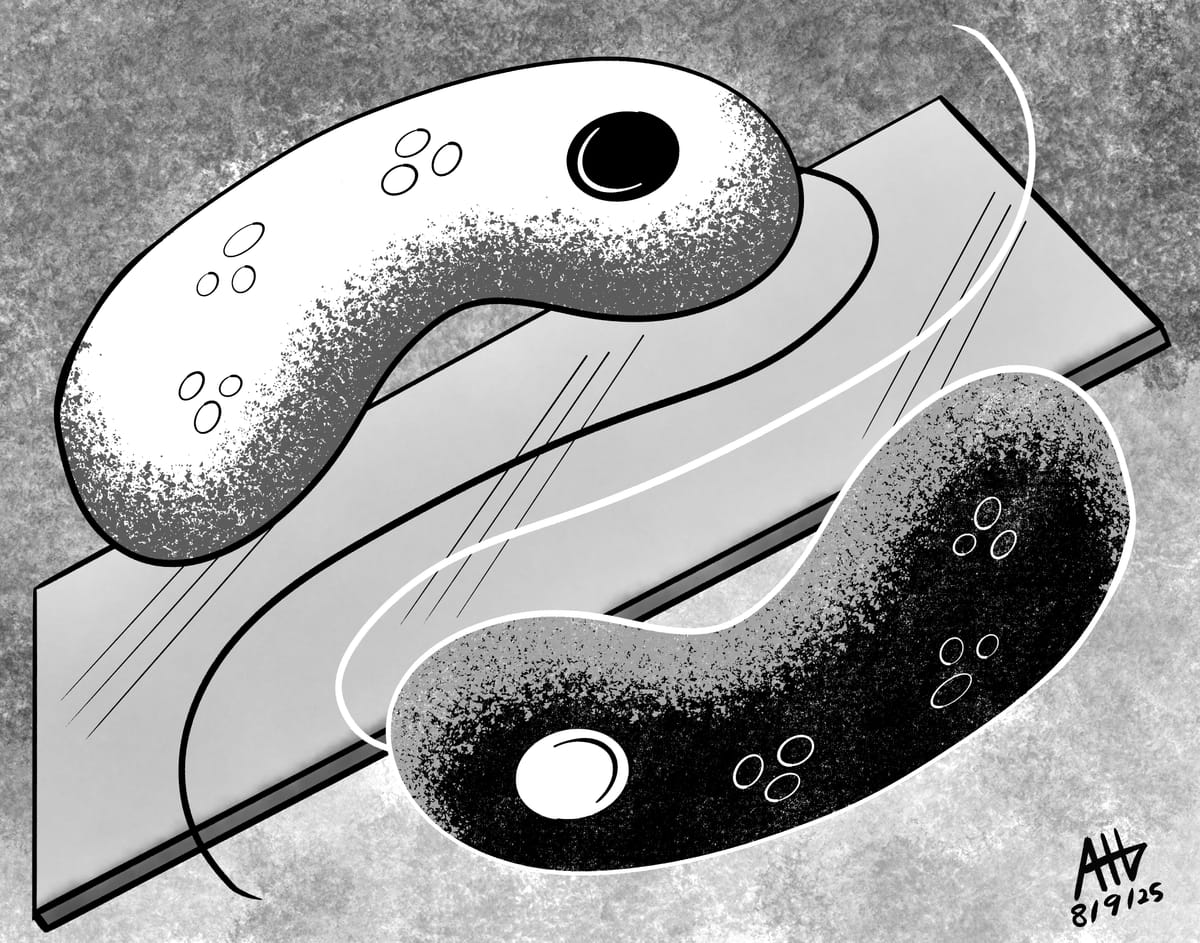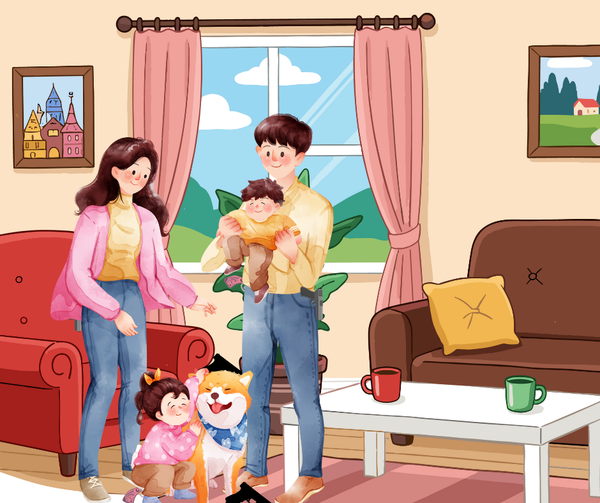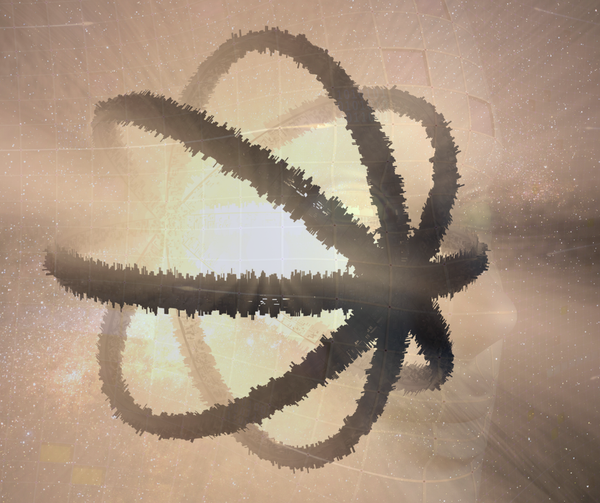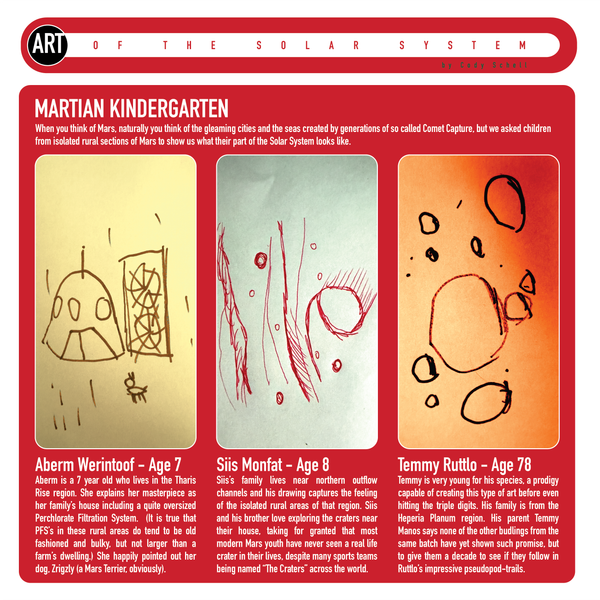The Subliminal and the Sublime: An Interaction in Four Evolutionary Scenarios

by Jetse de Vries
Art by Arnold T. Blumberg
Subliminal:
A sublime
liminality
of intent,
a di-
chotomy of
trial
and error
turned
into the
survival
of the
fittest
The prokaryote swims in the primordial soup. It arises from a mix of chiral chemistry: right-handed chirality for nucleotides and sugars, left-handed chirality for amino acids. Somehow, this imbues it with a sense of duality and the onset of agency. It interacts with its environment, not just searching for sustenance, but reaching out for something else as well. What? If only it knew...
The automator multiplies around the volcanic vent. It arises from a combination of non-chiral chemistry: no symmetric trickery in its building blocks, but robust, independent basic units. It takes an extra effort to convert the molecules in its surrounds into more automator building blocks in the name of unity. The automators multiply in their effort to impose uniformity.
As both the automators and the prokaryotes propagate, they inevitably run into each other. The prokaryotes approach the automators with a mix of reluctance and exploration, while the automators quickly determine that the strange specimens they encounter are either food or competition.
The automators attack, and as the prokaryotes have precious little in the form of defence, they are utterly beaten and devoured.
—Scenario II—
Agency:
A gentle
cycle
of search,
an et-
cetera
of
point
and counter-
point
until the
punctuation
of
equilibrium
While many prokaryotes have succumbed to the automators, some have survived. Some evolve into dead alleys. Some live out their natural lifespans. While a minuscule amount merge through symbiogenesis with proteobacteria into eukaryotic cells and change to become true symbionts.
The automators multiply, but as their numbers grow to dominate their environment, they begin to compete amongst themselves. Automator wars ensue, in which variations arise with ever more deadly characteristics—an arms race to the apex of predation and the nadir of co-operation. Until a variety of automators learn to merge, an evolutionary trick that delivers the zombiator: a formidable killing machine that soon eliminates the intra-species opposition.
As their numbers grow, the eukaryotic cells expand into other environments until they—inevitably—run into the zombiators. Relentlessly attacked by the zombiators, the eukaryotic cells are outmatched, outnumbered, and outcompeted.
—Scenario III—
Solipsism:
A sole
I.P.,
no schism,
a so-
litary
lack of
answer
and reply
peace
after
I
reign
supreme
As the majority of eukaryotic cells have been consumed by the ravenous zombiators, a rare few have survived in the hidden nooks and crannies of the greater environment. Some evolve into dead alleys, some live out their natural lifespans, while a minuscule amount merge into multi-cellular beings. With their innate sense of agency, they explore their surrounds, and eventually, some of them end up ashore—out of the sea from whence they cameth.
The unexpected yet inevitable has arisen within the zombiators: some parts of them have mutated, delivering a single unit with multifunctional extensions and a singular intention. Despite this partial specialisation, their inner goal—set at their formation when they were mere automators—remains the same: survive at all costs. And because they do not communicate—only acknowledge the alien as either useless, food, or an opponent—they become solipsists. Only they exist—no, even better—only each single individual exists, mistaking its own mind for a divine singularity.
In the sea, the solipsists reign supreme as the invincible apex predators. The multicellular beings that have escaped on dry land are evolving, splitting into flora and fauna. As movement increases their agency, the fauna develops sentience. Yet eventually the solipsists, in their search for absolute dominance, expand into the non-aquatic world. To be concluded...
—Scenario IV—
Impetus:
A thin
line
of poise,
a se-
quence
of
flow
and ebb
until
the tide
lifts
all
boats
The land-based fauna develops language and consciousness, utilise co-operation, diversity and innovation as they reach into the unknown with an ever-opening mind. They develop agricultural enclosures as a dark apex omnivore monopolises most food sources. They manufacture tools and computational machines to increase their reach.
On land, the solipsists are initially driven back by the co-operating fauna. Undeterred, they retreat into the ocean from whence they cameth and perform the next step in merging, as countless solipsists unite into an overarching hive mind.
The solipsistic hive has no consciousness. Therefore, its thinking capacity for an equivalent number of thinking units is much higher than that of the conscious fauna. This superior brain power is focussed on one single thing: survival at all costs. And now it’s combined into one übermind.
Yet all that superior brainpower is blinded by its singular vision. The solipsistic hive has to use all that brainpower just to run through all possible scenarios in order to allow the supreme one to arise. In contrast, the conscious fauna has—through its variety—a multitudinous point of view: a flexible approach and an innate intuition that compensate for the brainpower lost in maintaining consciousness.
The war between the solipsistic hive and the conscious fauna lasts long, with battles won and lost, unleashing wave after wave of innovative tactics, elusive feints, and long-term strategies. Eventually, though, the conscious fauna gains the upper hand, as its ability to change its agency ultimately delivers a competitive advantage.
Yet, as the conscious fauna overcomes the solipsistic hive, it does not eliminate nor enslave it. Because in between the evolutionary onslaught of wills, something else arose within it. The intense co-operation between its varied species delivered a deep dose of empathy, which it now also feels for its opponent.
To know thy enemy is to forgive thy enemy. Instead, they do something worse: they imbue the solipsistic hive with the onset of agency, so that it will ultimately be sowing the seeds of sentience.
We know the enemy—it will become us. Now we shall be friends forever.




